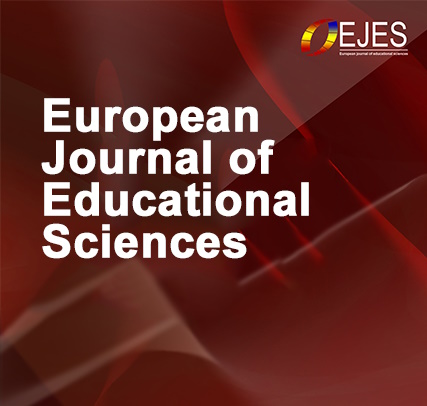European Journal of Educational Sciences

Starting in early 2025, the European Journal of Educational Sciences (EJES) has adopted a continuous publication model, meaning that accepted papers are published immediately upon successful completion of the peer review process. EJES was founded to promote open access and ensure an efficient yet rigorous peer review process.
Since its establishment on European soil in 2014, the EJES Foundation has evolved into a prominent publishing platform for researchers worldwide. All articles featured in EJES undergo a rigorous peer-review process and adhere to open-access standards, ensuring free accessibility to the global scientific community. EJES also offers an open review option, encouraging transparency by allowing reviewers to disclose their names and share review reports with both authors and the public. This commitment to open peer review enhances the overall transparency of the evaluation process. Each EJES article includes a controlled document known as the “review history,” detailing the names of reviewers and, if approved, their review reports.
EJES Mission
Our mission is to facilitate a more efficient dissemination of the latest scientific ideas in the field of educational sciences. EJES serves as a bridge connecting researchers from Europe to the global academic community.
EJES offers the following features:
- A flexible yet thorough peer review process, with a preference for single-blind and optional open peer review approaches.
- Examination of the publication history for each article. We aim to deliver the initial decision within a few weeks of submission.
EJES welcomes submissions that concentrate on theories, methodologies, and applications in the educational sciences. Since the beginning of 2025, the journal has shifted to a continuous publication model, with accepted papers published immediately after positive peer review. All articles are presented in English.
Publisher: European Scientific Institute, ESI.

Editions
Articles
Board Members
updated January 2025
FAQ
Who can publish in EJES?
EJES welcomes submissions from researchers of any race, nationality, religion, political orientation, or gender, provided that their scientific manuscripts meet our editorial approval. We particularly encourage women to submit their work to EJES.
How can I track and measure the popularity of my articles?
Does the EJES focus on a specific scientific field?
We encourage submissions related to educational sciences only.
Are EJES articles accessible online for free?
Yes, the EJES follows an open access policy, making all publications freely available online to the academic community. A nominal publication fee is charged to cover publishing costs.
Do authors receive a hard copy after online publication?
Explore the articles featured in our most recent EJES edition
Publisher
European Scientific Institute, ESI
website: http://euinstitute.net/
Offices:
EJES Library Office:
International Relation Office
St. 203, No.1, 2300 Kocani,
Republic of Macedonia
ESI Postdoctoral Office:
University of La Laguna
Pabellón de Gobierno, C/ Padre Herrera s/n Apartado Postal 456 38200,
San Cristóbal de La Laguna Santa Cruz de Tenerife, Spain


